The thunder of a Chinese bass drum mixed with the high-pitched whistle of a reed pipe. Dozens of young fans crowded round, and eagerly fell in with the rhythmic Hakka lyrics. It was a festive occasion, yet one bent on protest. "Let's sing our mountain songs! Let's go to the Legislative Yuan!"
The band played feverishly, strumming and sweating away a humid Taipei afternoon. "Say it loud. We're against the reservoir! Let's sing until the buildings become mountains, until the roads become rivers ..."
In Taiwan, where an atmosphere of pop music and idolatry reigns, Labor Exchange (
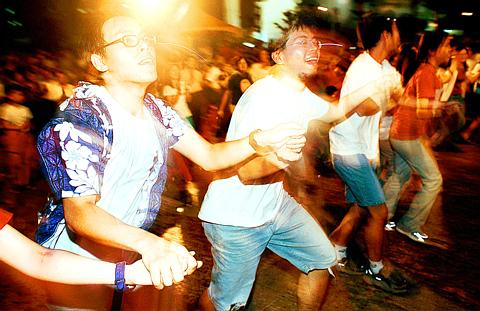
PHOTO: CHEN CHENG-CHANG, TAIPEI TIMES
But Labor Exchange does it anyway. They are compelled to, they say, by the sorry state of affairs vis a vis the island's environment, its crumbling traditions, its fractured sense of right and wrong. "When we see injustice, we feel we cannot just stand by with folded arms," says bassist Chen Kuan-yu (
Labor Exchange's roots are in the anti-Meinung Dam movement. The five men sing social protest songs to express their stand against building the dam, which the former KMT government deemed necessary to meet residential and industrial demands for clean water in the south. But it's also expected to flood Yellow Butterfly Valley, which has one of the highest densities of butterfly species in the world.
Wearing jeans, sneakers and simple T-shirts with Meinung Township patterns, Labor Exchange is probably the most prominent protest band in Taiwan. With compositions like "Let's Sing Mountain Songs (

PHOTO: CHEN CHENG-CHANG, TAIPEI TIMES
When the band accepted the honors, lead guitarist Lin Sheng-hsiang (
Just like the Meinung anti-dam movement, which emerged from a group of young Hakka intellectuals returning home and re-embracing their culture, the growth of Labor Exchange has also paralleled a journey to their ethnic roots. Four out of five members have Hakka heritage, and Lin comes from Meinung Township.
After the anti-dam movement began in 1993, Labor Exchange -- then known as Kuan-tsu Music Pit (
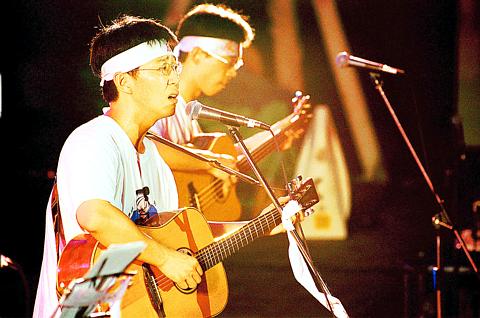
PHOTO: CHEN CHENG-CHANG, TAIPEI TIMES
Ditching city life turned out to be a wise move. Meinung became a source for artistic creativity, and also the base of a devoted fan clique, which even today follows them from town to town.
"The pace in the city is too fast for people to appreciate music from their hometown," Lin says.
"So we wanted to return to the life and the music of our hometown Hakka villages," he said.
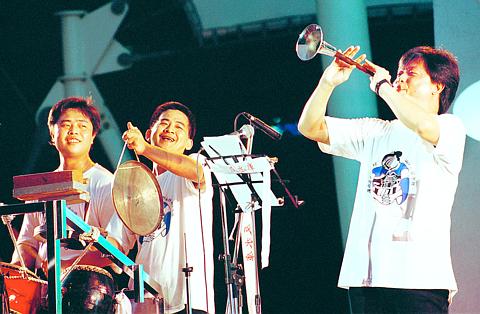
The return had profound influence on the style and approach the band took to making music. They eased away from straight rock-and-roll and incorporated more traditional instruments into their songs. Says Lin: "We felt embarrassed when we played with other world music bands, because we were using a Western music style to sing our culture." Chen, the bassist, adds, "Using rock and roll can easily be accepted by people and even win some applause, but it is no help with tracing our own cultural elements."
So Lin traded in his electric guitar for a traditional two-string full-moon guitar (Yueh Chin, 月琴) and a similar instrument called, simply, a "three string (
Their studio sessions were held in a refurbished tobacco warehouse that belonged to a labor team of the "labor exchange system," developed by tobacco farmers in Meinung in order to deal with labor shortages in a shrinking local agriculture market. This is the source of their name.
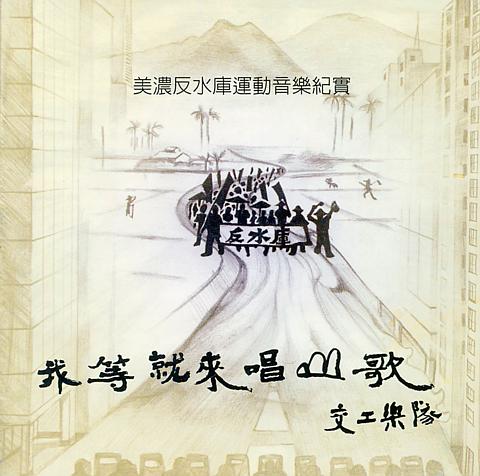
"When we were recording our album, our folks and farmers would sit down at the tobacco house and give suggestions to our music," says Chen.
The band then hit the road again, bringing its retooled sound not to pubs or concert halls, but to Hakka villages in places like Hsinchu, Tainan and Kaohsiung, where they would play in front of local temples, shrines and in market places. "Often, Obasans [old grandmas] come to our shows and sing with us," Lin says, as testament to their success in preserving and promoting the spirit of Hakka traditions.
Interestingly, critics once said Kuan-tsu's music was like mountain songs flavored with rock. Now critics say Labor Exchange's songs are "real rock songs with traditional Hakka instruments." Labor Exchange cleverly seizes the essential elements of rock as well as Hakka language and music.
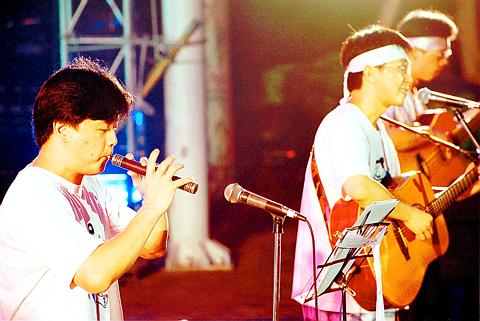
In many ways, Labor Exchange -- whose other members include Kuo Chin-tsai (
Take "Night Bus" (
Were the government really doing something, farmers would have been well-off, instead of waiting until over sixty, an age too late to change careers and too early to die. Today I'm gonna tell them, tell the God damned government ...
Other songs, like "Auh," which tells of a farmer calling his cattle to work, show the band's professed love of the countryside. Chen sees their award-winning album, Let's Sing Mountain Songs, as rock 'n' roll on the farmers' road -- a tribute to peasants. "We are concerned about people's lives in Taiwan's rural villages," says Lin. "Taiwan's agriculture has been declining since major conglomerates entered the countryside in the 70s, which was intensively affected the environment and peasants' livings. And the problem will become more serious when Taiwan enters the WTO."
In addition to its recent plaudits, the band has also seen other indications that its protest work is paying off. Labor Exchange is seen as representative of Taiwan's World Music genre by mainstream music critics, which has earned them invitations to domestic and international music festivals.
Yet their most rewarding moments have come from recent developments in the Meinung dam controversy. Last summer, with a majority of KMT legislators, the Legislative Yuan passed a NT$250 million budget for the dam construction, which was seen as a fateful defeat of the movement. But after President Chen Shui-bian's (
"But reactionary forces will not give up; our fights will not cease, either," says Chen. "There is still a lot to do."
For more information about Labor Exchange, go to www.leband.net. The band's album is available at Eslite book stores.

June 23 to June 29 After capturing the walled city of Hsinchu on June 22, 1895, the Japanese hoped to quickly push south and seize control of Taiwan’s entire west coast — but their advance was stalled for more than a month. Not only did local Hakka fighters continue to cause them headaches, resistance forces even attempted to retake the city three times. “We had planned to occupy Anping (Tainan) and Takao (Kaohsiung) as soon as possible, but ever since we took Hsinchu, nearby bandits proclaiming to be ‘righteous people’ (義民) have been destroying train tracks and electrical cables, and gathering in villages

Dr. Y. Tony Yang, Associate Dean of Health Policy and Population Science at George Washington University, argued last week in a piece for the Taipei Times about former president Ma Ying-jeou (馬英九) leading a student delegation to the People’s Republic of China (PRC) that, “The real question is not whether Ma’s visit helps or hurts Taiwan — it is why Taiwan lacks a sophisticated, multi-track approach to one of the most complex geopolitical relationships in the world” (“Ma’s Visit, DPP’s Blind Spot,” June 18, page 8). Yang contends that the Democratic Progressive Party (DPP) has a blind spot: “By treating any

Swooping low over the banks of a Nile River tributary, an aid flight run by retired American military officers released a stream of food-stuffed sacks over a town emptied by fighting in South Sudan, a country wracked by conflict. Last week’s air drop was the latest in a controversial development — private contracting firms led by former US intelligence officers and military veterans delivering aid to some of the world’s deadliest conflict zones, in operations organized with governments that are combatants in the conflicts. The moves are roiling the global aid community, which warns of a more militarized, politicized and profit-seeking trend

This year will go down in the history books. Taiwan faces enormous turmoil and uncertainty in the coming months. Which political parties are in a good position to handle big changes? All of the main parties are beset with challenges. Taking stock, this column examined the Taiwan People’s Party (TPP) (“Huang Kuo-chang’s choking the life out of the TPP,” May 28, page 12), the Democratic Progressive Party (DPP) (“Challenges amid choppy waters for the DPP,” June 14, page 12) and the Chinese Nationalist Party (KMT) (“KMT struggles to seize opportunities as ‘interesting times’ loom,” June 20, page 11). Times like these can